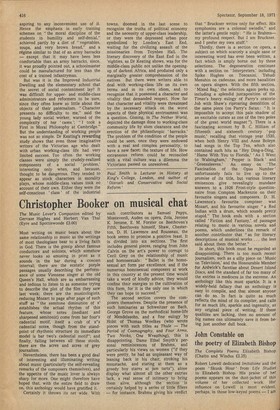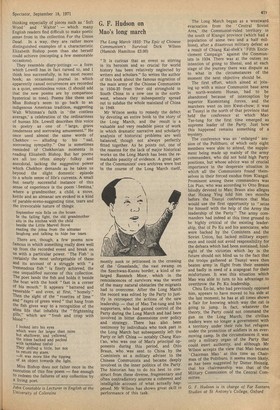John Constable on the poetry of Elizabeth Bishop
The Complete Poems Elizabeth Bishop (Chatto and Windus £2.25)
Robert Lowell dedicated Imitations and the poem 'Skunk Hour' from Life Studies to Elizabeth Bishop. His praise of her poems appears on the dust-jacket of this volume of her collected work. Her influence on Lowell is most evident, perhaps, in those low-keyed poems — I am
thinking especially of pieces such as ' Soft Wood' and ' Walter ' — which many English readers find difficult to make poetic sense from in the collection For the Union Dead. In a way, they are rather more distinguished examples of a characteristic Elizabeth Bishop poem than she herself could achieve (excepting a few memorable occasions).
They resemble diary-jottings — a form which Lowell has in fact turned to, and I think less successfully, in his most recent book; an occasional journal in which apparently casual occurrences are recorded in a quiet, emotionless voice. (I should add that the new poems are by comparison hysterical in tone). Poems like these and Miss Bishop's seem to go back to an indigenous American tradition, suggesting Walt Whitman's faith in 'the costless average,' a celebration of the ordinariness of human life. Lowell describes this voice in poetry as one of "large, grave tenderness and sorrowing amusement." He once used almost the same words of Chekhov — alluding to his "sad, sorrowing sympathy." One is sometimes reminded of Chekhovian moments in reading Elizabeth Bishop. But her poems are all too often simply folksy and anecdotal, lacking the suggestive power which Chekhov demands as he takes us beyond the slight domestic episode to a whole sense of life's currents. A small but nearly successful instance of this sense of experience is the poem : Sestina,' where a grandmother, a child, a stove, kettle and an almanac are evoked in a kind of parable-scene•suggesting time, tears and the irrevocable nature of things:
September rain falls on the house.
In the failing light, the old grandmother sits in the kitchen with the child beside the Little Marvel Stove reading the jokes from the almanac laughing and talking to hide her tears.
There are, though, a few poems now famous in which something really does well up from the recorded event and break on Us with a particular power. 'The Fish' is certainly the most unforgettable of these and its account of a struggle with "a tremendous fish" is finely achieved, the one unqualified success of this collection. The poet lands the fish and holds it beside the boat with the hook "fast in a corner Of his mouth." It appears "battered and venerable" and even, at first, "homely." Then the sight of the " rosettes of lime " and "rages of green weed" that hang from the fish gives way to a recognition of the alien life that inhabits the "frightening gills," which are "fresh and crisp with blood ":
I looked into his eyes Which were far larger than mine but shallower, and yellowed, the irises backed and packed With tarnished tinfoil . . .
They shifted a little, but not to return my stare. —It was more like the tipping of an object towards the light.
Miss Bishop does not falter once in the execution of this fine poem — fine enough to redeem the failures of any collection by a living poet.
John Constable is Lecturer in English at the University of Coleraine



































 Previous page
Previous page